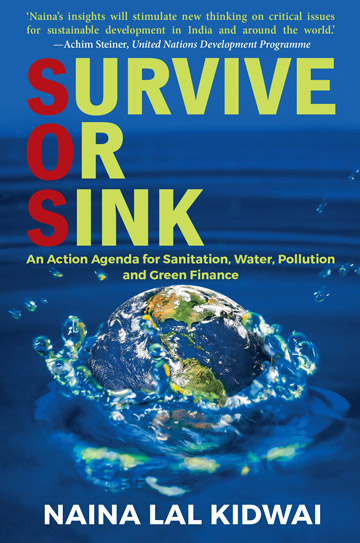From a high profile corporate banker to someone who has no qualms about talking on shit and faecal matter, Naina Lal Kidwai surprises with the way she addresses these issues. While women are known to juggle several roles, Kidwai is probably a level ahead. She advises a private equity fund, mentors women, works on sanitation and plays an active role in FICCI, all this after having retired as HSBC's India head in 2015. It would actually be wrong to say "retired". At 61, her day is packed like any other corporate CEO and she frequently shuttles between Delhi and Mumbai. In an interview with THE WEEK, she talks about her work with India Sanitation Coalition and her latest book, Survive or Sink. And as the slug line says, it is really the action agenda for sanitation, water, pollution and green finance.
Her passion for sanitation is evident when she talks about some of the work that is happening on the ground. As opposed to a lot of experts who are filled with criticism on these subjects, she comes across as a very positive person. While lauding the Swachh Bharat Mission and increase in the number of ODF (open defecation free) districts, she says that the next step has to be treatment of waste, specifically the faecal waste. "Cities like Delhi treat only 30-40 per cent of the sewage. If we don't tackle the problem of treatment, it would be most expensive failure in the history," she says.
As a nature lover, she enjoyed watching birds on the banks of the Yamuna during her college days but is now deeply pained to see the river becoming a sewer for Delhi's untreated waste. The solution, she says, is in FSTPs (Faecal sludge treatment plants) which have been quite successful in countries like Malaysia and Indonesia. These plants can be set up in apartment complexes and run affordably.
Her book also documents the role of private sector in ensuring hygiene and sanitation. In fact, one of the main purposes of India sanitation Coalition (ISC) is to galvanise support from private players on these issues. "A beginning was made when they started looking at the issue of toilets in schools. But we need more of them. Today, 180 corporates have come in and they are mostly big firms. We need smaller companies to also join in this movement", says Kidwai.
The first Indian woman MBA graduate at Harvard is synonymous with women empowerment and has a whole lot of perspective to offer on issues of women in corporate world or women on boards. While most companies rue the lack of enough women directors, Kidwai bluntly denies it. "There are enough capable and interested women out there. You just need to give them an opportunity. The boys club in corporate boardrooms is surely changing but very slowly," she says.
Despite the headwinds, she is still optimistic about India's banking sector. "NPAs have gone up but that's true for every bank. The banking system is very secure. Look at the capital adequacy ratio of Indian banks; they are way ahead of global peers. There have been frauds and frauds happen everywhere. What we really need to make sure is to have zero tolerance for failure.. at whatever level it is," she signs off.


